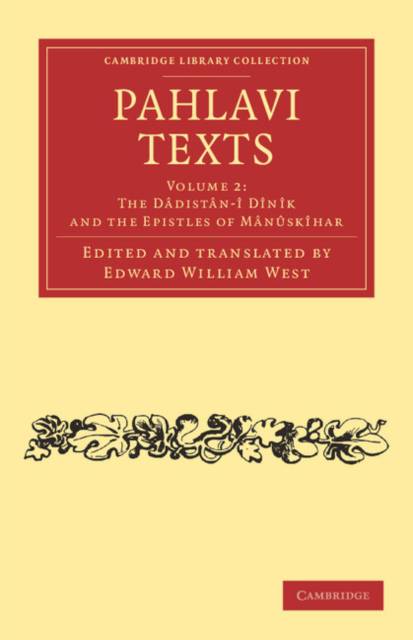
Bedankt voor het vertrouwen het afgelopen jaar! Om jou te bedanken bieden we GRATIS verzending (in België) aan op alles gedurende de hele maand januari.
- Afhalen na 1 uur in een winkel met voorraad
- In januari gratis thuislevering in België
- Ruim aanbod met 7 miljoen producten
Bedankt voor het vertrouwen het afgelopen jaar! Om jou te bedanken bieden we GRATIS verzending (in België) aan op alles gedurende de hele maand januari.
- Afhalen na 1 uur in een winkel met voorraad
- In januari gratis thuislevering in België
- Ruim aanbod met 7 miljoen producten
Zoeken
Pahlavi Texts - Volume 2
€ 99,95
+ 199 punten
Omschrijving
Published between 1880 and 1897 as part of Max Müller's Sacred Books of the East series, this five-volume translation of Pahlavi texts was the work of Edward William West (1824-1905). Largely self-taught, West developed his knowledge of ancient oriental languages in India, where he worked as a civil engineer. After returning to Europe, West focused on the study of sacred Zoroastrian texts and prepared these translations of Pahlavi manuscripts. His writings and editions are still referenced today in Indo-Iranian studies. Volume 2 contains the ninth-century Dâdistân-î Dînîk and Epistles of Mânûskîhar. The former are religious judgments or decisions given by Mânûskîhar, a high priest of Iran, in answer to ninety-two queries put to him by fellow Zoroastrians. Along with the Epistles, relating to complaints made to Mânûskîhar about his brother Zâd-sparam, these texts give the reader an insight into the Zoroastrianism of the period, its tenets, and its relationship with the developing Islamic faith.
Specificaties
Betrokkenen
- Vertaler(s):
- Uitgeverij:
Inhoud
- Aantal bladzijden:
- 522
- Taal:
- Engels
- Reeks:
Eigenschappen
- Productcode (EAN):
- 9781108054300
- Verschijningsdatum:
- 13/12/2012
- Uitvoering:
- Paperback
- Formaat:
- Trade paperback (VS)
- Afmetingen:
- 140 mm x 216 mm
- Gewicht:
- 657 g

Alleen bij Standaard Boekhandel
+ 199 punten op je klantenkaart van Standaard Boekhandel
Beoordelingen
We publiceren alleen reviews die voldoen aan de voorwaarden voor reviews. Bekijk onze voorwaarden voor reviews.








